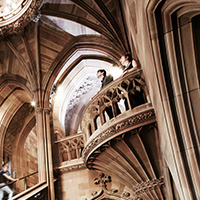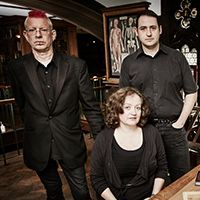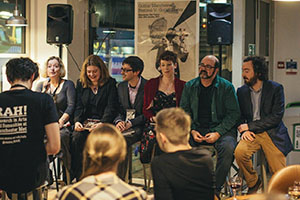- 200 years
- Study
- International
- Business and employers
- Research
- About us
The past decade has witnessed an explosion of popular and academic interest in the Gothic mode as it manifests itself across a range of literary, filmic, televisual and popular cultural texts.
 The mission of the Manchester Centre for Gothic Studies is to promote the study of the Gothic both nationally and internationally, and to work across age ranges and levels of study, from sixth form to PhD and beyond. To do this we have run conferences and symposia, Sixth Form Gothic Study Days, creative writing workshops and Continuing Professional Development courses that are of particular interest to those who teach the Gothic, or those who simply wish to take a university-level course for personal enrichment. To date, we have run seven Gothic Manchester Festivals and multiple Gothic networking days, as well as numerous public research lectures and seminars, often in collaboration with our extensive network of partners and stakeholders across Greater Manchester. This has helped us not only to showcase our research but also to bring theoretically and historically informed understandings of Gothic culture to a wider non-specialist audience. In 2018 we hosted the 14th conference of the International Gothic Association, the most significant gathering of Gothic academics in the world.
The mission of the Manchester Centre for Gothic Studies is to promote the study of the Gothic both nationally and internationally, and to work across age ranges and levels of study, from sixth form to PhD and beyond. To do this we have run conferences and symposia, Sixth Form Gothic Study Days, creative writing workshops and Continuing Professional Development courses that are of particular interest to those who teach the Gothic, or those who simply wish to take a university-level course for personal enrichment. To date, we have run seven Gothic Manchester Festivals and multiple Gothic networking days, as well as numerous public research lectures and seminars, often in collaboration with our extensive network of partners and stakeholders across Greater Manchester. This has helped us not only to showcase our research but also to bring theoretically and historically informed understandings of Gothic culture to a wider non-specialist audience. In 2018 we hosted the 14th conference of the International Gothic Association, the most significant gathering of Gothic academics in the world.

Since its inception in 2013, the Manchester Centre for Gothic Studies has been committed to bringing the research of our core and affiliated staff into the wider community. To this end, we have carried out a number of public engagement activities, and established the citywide annual Gothic Manchester Festival, run in collaboration with RAH (Research in Arts and Humanities). Through our collaborations with cultural institutions such as the John Rylands Library, HOME Cinema, Grimmfest Festival, Ordsall Hall, Manchester City Art Gallery, Manchester Walks and the International Anthony Burgess Centre, we have actively encouraged the production of Gothic culture across Greater Manchester. In 2018, we co-founded the HEIST award-winning initiative Haunt Manchester, a website and network of 200 partners that aims to curate, celebrate and reflect critically on Greater Manchester's Gothic cultural offerings, from music and nightlife to architecture and fine art. Hosted by Visit Manchester, Haunt has been instrumental in turning the city into a Gothic destination of sorts. In previous years, Centre members have also collaborated fruitfully with national organisations such as the British Library, the British Film Institute, the BBC and the S.O.P.H.I.E. foundation.
The Manchester Centre for Gothic Studies runs the Gothic pathway of the MA English Studies, a taught Masters-level course that focuses explicitly on this artistic mode and which includes specialist units on ‘The Rise of the Gothic’, ‘Twentieth-Century Gothic’ and ‘Post-millennial Gothic’. The only one of its kind worldwide, the Gothic MA offers a rare opportunity to explore Gothic literature from the eighteenth century to the present; thoroughly interdisciplinary in its reach, it also extends to the examination of the Gothic in architecture, film, television and other media. Members of Staff in the Centre have considerable experience of supervising postgraduate dissertations and theses on all aspects of the Gothic, from the eighteenth century through to the mode’s modern and contemporary incarnations in horror film and fiction. In fact, with over 15 ongoing specialist projects and 20 completions, ours is one of the largest Gothic postgraduate communities in the world. We also run annual initiatives such as the Gothic reading group or the Postgraduate Gothic Study Day, merely two of many opportunities designed to foster connections between staff, MA students, Postgraduate researchers and the general public.

The Centre is based in the Department of English and co-led by Prof Dale Townshend (Professor of Gothic Literature) and Dr Xavier Aldana Reyes (Reader in English Literature and Film). Our staff members have long-standing interests in the Gothic and use their areas of specialisation to inform their teaching at both undergraduate and postgraduate levels. The Gothic Centre is home to a plethora of scholars specialised in the Gothic. These include, in alphabetical order: Centre founder Dr Linnie Blake (Reader in Gothic Literature and Film), Dr Eleanor Beal (Lecturer in English Literature), Dr Emily Brick (Senior Lecturer in Film and Media Studies), Dr Matthew Carter (Senior Lecturer in Film), Dr Rachel Dickinson (Reader in English Literature), Dr Matt Foley (Lecturer in Modern and Contemporary Literature), Dr Chloé Germaine (Senior Lecturer in English and Film), Dr Sarah Ilott (Senior Lecturer in English Literature and Film), Dr Emma Liggins (Reader in English Literature), Dr Angelica Michelis (Senior Lecturer in English Literature), Dr Sorcha Ní Fhlainn (Senior Lecturer in Film Studies and American Studies), and Dr Catherine Wilcox (Senior Lecturer in Creative Writing).
In addition to this, the university has a robust interdisciplinary Gothic Research cluster that brings together colleagues in other disciplines and departments who have strong interests in the Gothic, including Dr Julian Holloway (Natural Sciences), Dr Peter N. Lindfield (History) and Dr Kathryn Starnes (International Relations). The Centre also enjoys ongoing affiliations with such established scholars as Dr Anna Powell (English, Honorary Research Fellow), Prof Joanna Verran (Microbiology, Emeritus Professor) and Prof Sue Zlosnik (Emeritus Professor), and has collaborated with colleagues in Fashion (Dr Jennifer Richards), Human Geography (Prof Craig Young), Health, Psychology and Communities (Dr Ken Drinkwater) and Music (Dr Martin Blain).
Beyond the UK, the Manchester Centre for Gothic Studies benefits from close research and pedagogical links with Gothic scholars in North America, Central and South America, Europe, Australia, New Zealand and elsewhere.
You can read more about our Gothic experts and their areas of expertise in the Gothic Research Cluster page. You can browse through some of the Centre's key publications since its foundation on the Key Publications tab. You can also track our staff member's appearances on the press and media in the Press and Media tab.
We are currently working closely with the following organisations. If you would like to be involved in the work of the Centre please contact us.
The Gothic Centre also has strong ties with a number of key presses in the Gothic Studies world (see our Affiliated Presses tab).
You can email the Gothic Centre on gothic@mmu.ac.uk. You can also follow us on Twitter (@gothicmmu) and YouTube channel, and request to join our Facebook group.